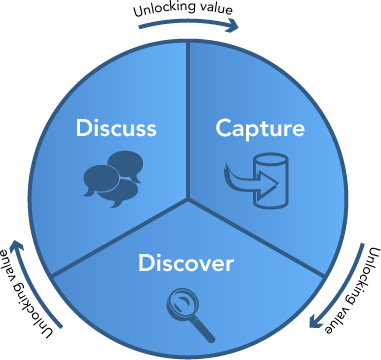Back in 2003 when I first started developing collaboration systems, a lot of organisations had something like this:
- An email system in which lots of useful conversations resided but which was difficult to search and often limited in how much was kept.
- A content management system in which more valuable information was held, but which was not part of users’ everyday workflow and was not really geared to easy contributions.
Skip forward sixteen years and frankly things haven’t improved that much:
- Conversations moving to Slack or Microsoft Teams have just opened up another silo, while the splintering of discussions into tinier pieces makes finding information later more of a challenge.
- Important information, while now more likely to be held in a dedicated collaboration system like Confluence or SharePoint, is still isolated from where conversations are mainly taking place.
This isn’t a new problem. For several decades people working in the knowledge management field have been considering the problems of tacit knowledge versus explicit knowledge and ways that organisations can better capture information of value. When we designed Jiglu, we looked for how we could bridge the divide between those two sides:
- Making it easy to transfer information from conversations into a more formal setting. If something comes up in an email discussion or in a group instant message then with just a few clicks it can be transferred into the knowledge wiki.
- Supporting different roles within a collaboration space, so some members can be involved just with contributing while others can do more organisation, such as taking useful information from conversations and making it suitable for long-term retention.
- Using simple workflow to ensure that knowledge is of a suitable quality: you can transfer something in a conversation then come back to it later to work on or have others work on it; for bigger teams you can require approval from a certain number of members before something is published; after a certain amount of time has elapsed then entries can go back for review to ensure they are still valid.
Once an entry has been published in the wiki, Jiglu also helps you connect it to other resources:
- There’s an audit trail back from a published entry in the knowledge wiki to the conversation where it originally came from. Sometimes it’s useful to see the original context and who said it.
- Jiglu’s automatic tagging engine connects conversations and content, so if a new discussion is taking place it’s very easy to see what else is known on that topic, whether it’s explicit information in a knowledge entry or a tacit information in a group email discussion or instant message.
- Search encompasses both content and conversations, prioritising the wiki entries where knowledge is being retained for the long term but also letting you find the nuggets that may be buried deeper in conversations.
Once you’ve captured something in the wiki, that isn’t the end point either. Jiglu lets you easily start discussions around entries, which in turn can feed back into updates to an entry or perhaps a new one.

It’s all part of a continual cycle that we hope better brings together these two sides, eliminating the information silos and ensuring teams can work together more effectively. And for the future we’re looking at ways that we can use AI to better support users in these processes.
If you’d like to try it out, it’s very easy to get started with Jiglu.